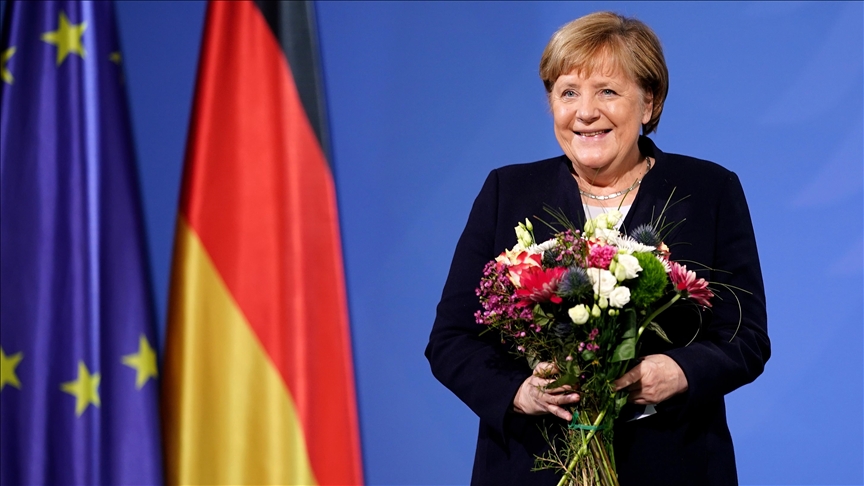
BERLIN
With German Chancellor Angela Merkel stepping down after 16 years in office, the main questions remain: What is her legacy, what did she achieve and where did she fail?
The 67-year-old politician has shown that she is a skillful crisis manager, guiding not only her country but also the European Union through a debt crisis, a wave of hundreds of thousands of migrants from the Middle East and Afghanistan, and the most lethal pandemic in a century.
The financial, euro, refugee and, ultimately, coronavirus crises all occurred during Merkel's term and they shaped her reign like few other events, apart perhaps from the Fukushima reactor disaster in March 2011. At that time, Merkel changed course in her nuclear policy. The Cabinet decided very quickly to phase out nuclear power.
Merkel compared to Adenauer, Kohl
The Christian Democratic Union (CDU) parliamentary group leader Ralph Brinkhaus honored Merkel for her 16 years as head of government, telling media representatives in Berlin that she "shaped an era. She stands in a row with (former chancellors) Konrad Adenauer and Helmut Kohl."
Merkel was an incredibly successful federal chancellor, said Brinkhaus. During her reign, for example, the number of unemployed halved, and much was achieved in many social, foreign and European policy issues, he added.
His remarks were echoed by Norbert Lammert, the former German parliament president, who also hailed Merkel on the anniversary of her first swearing-in 16 years ago on Nov. 22, 2005.
"Angela Merkel has many strengths. Her almost superhuman patience in enduring even the most absurd positions of national and international partners is particularly outstanding."
Lammert, who is now the chairman of the CDU-affiliated Konrad Adenauer Foundation, added: "Her stoic calm made it possible for her to continue spinning the thread of conversation and not let it tear off, even in particularly tricky moments."
Merkel had smartly adopted the center ground position of German politics, which had made her such a powerful electoral force, according to Matthias Matthijs, a senior fellow at the European Council on Foreign Relations.
Most political pundits in Berlin would agree that Merkel's party, the CDU, would have comfortably won the recent elections if she had chosen to run for a record fifth term.
'Merkantilism' becomes Merkel's guiding policy
"Merkel has been mostly guided by what is known as 'Merkantilism, the systematic prioritization of German commercial and geoeconomic interests over democratic values, human rights and intra-EU solidarity," Matthijs wrote.
"There are numerous examples. During the Greek debt crisis, Merkel's primary policy aim was to protect the solvency of German banks, and putting the main burden of adjustment on Southern Europe through austerity and structural reform policies has left lasting scars," he said.
"She was unwilling to directly confront the authoritarian tendencies of Prime Ministers Viktor Orban in Hungary and Jaroslaw Kaczynski in Poland, partially due to German commercial interests. She pursued a comprehensive investment agreement with China over opposition from other EU leaders," Matthijs added.
Furthermore, in the aftermath of Russian President Vladimir Putin's 2014 annexation of Crimea, she undermined her own sanctions regime against Russia to give Putin the much bigger prize of the Nord Stream 2 gas pipeline project.
Keeping EU together during decade of crises
According to Matthijs, at the EU level, it was Merkel's adamant insistence on austerity and structural reform during the eurozone debt crisis as well as her steadfast determination to complete the controversial Nord Stream 2 natural gas pipeline with Russia and her acceptance of jointly issued EU bonds in anticipation of the economic fallout of the COVID-19 pandemic.
Merkel managed to keep the EU together during a decade of crises – among them the euro debt crisis, Russian aggression in Ukraine, the refugee crisis, the Brexit vote in the UK, and the transatlantic rift during Donald Trump's US presidency. Arguably her most important decision has been her embrace of jointly issued EU bonds in the 2020 spring, according to Matthijs.
- Merkel highlights right time to bid farewell to politics
Taking stock of her chancellorship, Merkel said the 16 years had been eventful and often very challenging.
"They challenged me politically and personally. And at the same time, they always fulfilled me too."
And what is Merkel doing in the future? She wants to withdraw from the big political scene as she recently told the Sunday daily Frankfurter Allgemeine Sonntagszeitung.
"Now I'll see that a few things will follow what came up a bit short as chancellor, maybe travel or read a little or just have leisure knowing that not in the next 20 minutes, something revolutionary can happen again. I am looking forward to that."
Merkel already told German photographer Herlinde Koelbl in 1998: "I would like to find the right time to leave politics at some point. Then I don't want to be a half-dead wreck."
Unlike many of her predecessors, Merkel did manage to choose the right time to say goodbye to politics.
Anadolu Agency website contains only a portion of the news stories offered to subscribers in the AA News Broadcasting System (HAS), and in summarized form. Please contact us for subscription options.







